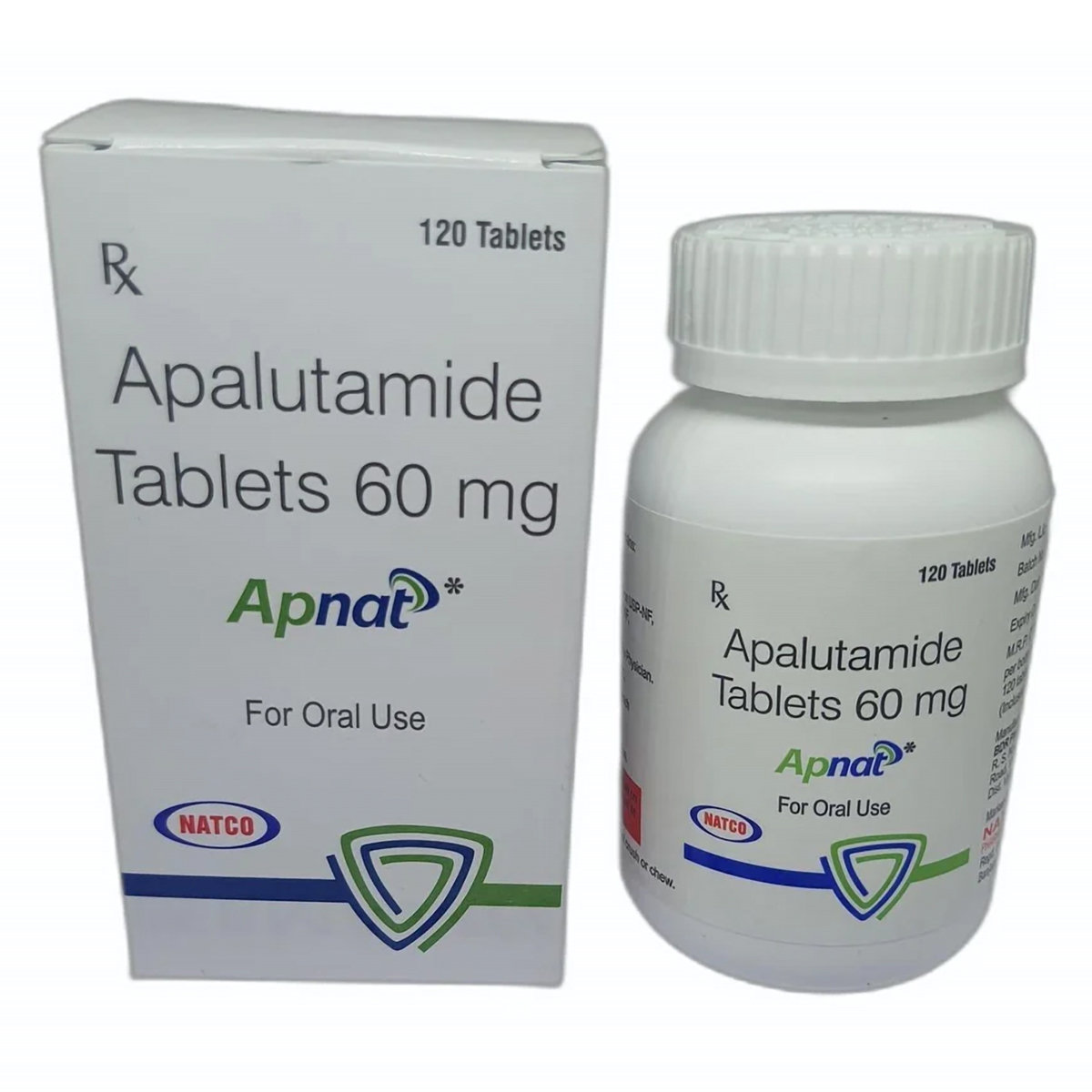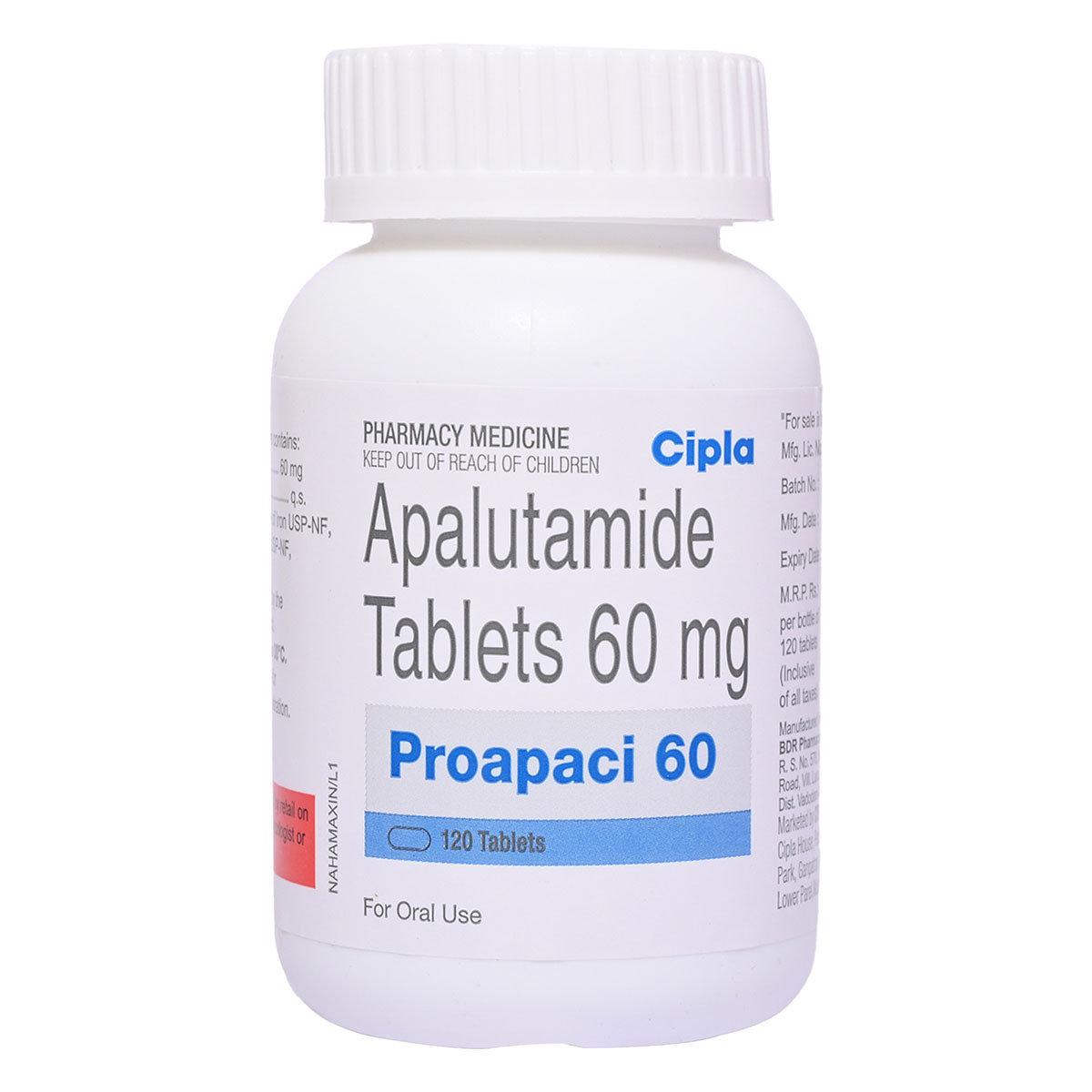Apalutamide
About Apalutamide
Apalutamide is an anti-androgen medicine used in the treatment of prostate cancer. Prostate cancer is a form of cancer that begins in the prostate gland cells in men. Symptoms may include difficulty in urinating, pain, numbness, etc. Apalutamide is used in the treatment of metastatic castration-sensitive prostate cancer and non-metastatic castration-resistant prostate cancer.
Apalutamide contains Apalutamide, which belongs to the class of androgen inhibitors. It works by inhibiting the production of the testosterone hormone and thus stops the growth and spread of cancer.
Apalutamide may cause certain side effects such as fatigue, headache, diarrhoea, muscle pain, hot flushes, loss of appetite, and skin rash. These side effects usually subside without any medical attention. Take Apalutamide as prescribed by your doctor.
Apalutamide should be avoided if you are allergic to it. Inform your doctor before taking Apalutamide if you have any pre-existing or a history of liver/kidney disease, cardiovascular diseases like myocardial ischemia, or seizures. Apalutamide is not recommended for use in children as the safety and efficacy of this medicine are not established. This medicine is only intended for male patients.
Uses of Apalutamide
Medicinal Benefits
Apalutamide contains Apalutamide, which belongs to the class of androgen inhibitors. Testosterone is a natural hormone produced by the body. This causes an increase in cancer cells in the prostate gland. Apalutamide works by inhibiting the production of the testosterone hormone and thus stops the growth and spread of cancer. It is mainly intended for use in men only.
Directions for Use
- Take Apalutamide with or without food or as advised by a doctor.
- Recommended to take once daily or as advised by your doctor.
- Swallow the medicine as a whole with a glass of water.
- Do not crush, break, or chew it.
Storage
Side Effects of Apalutamide
- Fatigue
- Headache
- Diarrhoea
- Muscle Weakness
- Hot Flushes
- Loss of Appetite
- Decreased weight
- Increased blood pressure
- Skin rash
Drug Warnings
Apalutamide should be avoided if you are allergic to it or any other components present in it. Let your doctor know about your complete medical and medication history beforehand to rule out any side effects. Apalutamide is not recommended for use in children as the safety and efficacy of this medicine are not established. Apalutamide may cause cardiovascular and ischemic events, seizures, falls, and fractures in some patients. Hence, inform your doctor if you have/had any conditions like liver/kidney disease, cardiovascular disease, or taking any other medicines before taking Apalutamide as it may cause serious side effects.
Drug Interactions
Drug-Drug interactions: Apalutamide may interact with CYP3A4 substrates (clarithromycin, itraconazole, ketoconazole, verapamil), CYP2C19 substrates (omeprazole, warfarin, diclofenac, phenytoin), CYP2C9 substrates (cyclophosphamide, ibuprofen, trosemide), and some other drugs.
Drug-Food interactions: No interactions found.
Drug-Disease interactions: Apalutamide should be used with caution in patients with severe liver and kidney failure and cardiac problems.
Drug-Drug Interactions Checker List:
Safety Advice

Alcohol
consult your doctorThe interaction of Apalutamide with alcohol is unknown. It is advisable to consult your doctor if you have concerns.

Pregnancy
not applicableNot intended for women.

Breast Feeding
not applicableNot intended for women.

Driving
cautionApalutamide may cause seizures. Do not drive vehicles or operate machinery until you know how this medication affects you.

Liver
consult your doctorInsufficient data available on the use of Apalutamide in patients with liver impairment. If you have liver problems, inform your doctor before taking Apalutamide.

Kidney
consult your doctorThe effect of Apalutamide in patients with kidney impairment is unknown. If you have kidney disease, inform your doctor before taking Apalutamide.

Children
unsafeApalutamide is not recommended for use in children as the safety and efficacy of this medicine are not established.
Habit Forming
Diet & Lifestyle Advise
- Include vegetables like cauliflower, cabbage, broccoli, spinach and kale in your meal. This food slows the growth of prostate cancer and even reduces the risk of prostate cancer.
- It is advised to consume fewer dairy products as these foods may increase the risk of prostate cancer.
- Physical activity helps strengthen muscles, reduce fatigue, help with weight loss, and give strength.
- Maintain a healthy weight by doing regular simple exercises and yoga.
- Getting adequate sleep as resting helps improve your health and mental ability and improves attention.
- Avoid including high amounts of red meat in your diet. When meat is cooked, it may increase the risk of developing prostate cancer.
Special Advise
- Apalutamide is not recommended for use in female patients and paediatrics.
- Regular monitoring of liver and kidney functioning is recommended, with liver/kidney function tests recommended during Apalutamide usage.
- Monitor the patients for any signs of cardiovascular conditions while on treatment with Apalutamide.
Patients Concern
Disease/Condition Glossary
Prostate cancer: The prostate gland is a small walnut-sized gland present under the bladder which is responsible for the production of seminal fluid. Prostate cancer is a carcinogenic condition that occurs when the cells of the prostate gland increase out of control. The main cause of this condition is unknown. However, a few underlying reasons that increase the risk for this condition include age, family history, ethnic group, genetic factors, obesity, etc.
FAQs
Apalutamide is used to treat Prostate cancer.
Apalutamide contains Apalutamide, which works by inhibiting the production of the testosterone hormone and thus stops the growth and spread of cancer.
No, do not stop taking Apalutamide without consulting your doctor. It is recommended to take this medicine for the entire prescribed duration, even when symptoms resolve.
Take Apalutamide as advised by your doctor. However, if you forget or miss any dose of Apalutamide, take it as soon as you remember unless it is time for your next dose. But do not double the dose.




